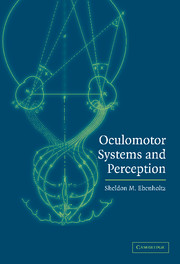Book contents
- Frontmatter
- Contents
- Figure Captions
- Table Headings
- Foreword
- Preface
- 1 Introduction
- 2 Some Basic Concepts of Physiological Optics
- 3 Oculomotor Systems
- 4 Oculomotor Factors in Perception
- 5 Theoretical Issues and Underlying Mechanisms
- 6 Concluding Remarks
- Appendix The Ametropias and Other Common Visual Anomalies
- References
- Subject Index
- Author Index
1 - Introduction
Published online by Cambridge University Press: 10 October 2009
- Frontmatter
- Contents
- Figure Captions
- Table Headings
- Foreword
- Preface
- 1 Introduction
- 2 Some Basic Concepts of Physiological Optics
- 3 Oculomotor Systems
- 4 Oculomotor Factors in Perception
- 5 Theoretical Issues and Underlying Mechanisms
- 6 Concluding Remarks
- Appendix The Ametropias and Other Common Visual Anomalies
- References
- Subject Index
- Author Index
Summary
The Context for Perception
The scientific study of perception is the study of the qualities of experience and the conditions under which they occur. Although Gestalt psychologist Kurt Koffka (1935) set the scientific goal of explaining why the world looks as it does, his treatment of many other dimensions of consciousness, ranging from sound localization to cognition, indicated that there is in principle no reason why perception scientists should not also study all forms of experience, including the aesthetic experiences as well as pain. In fact, the discipline of perception is as broad as the states and varieties of consciousness itself.
Nevertheless, there are several reasons why the scientific study of visual experience preceded, and also seems to predominate, the study of other modalities of consciousness. First is the rule of scholarly inertia. Vision and visual perception have been studied for more than 2500 years (Wade, 1998), as a result of the Ancient Greeks' interests in astronomy and optics and to the subsequent realization that the eye could be treated as an optical instrument (Boring, 1950). Therefore, it continues to be studied simply because it has proved itself to be a valid and significant body of knowledge. Of course, the Ancient Greeks did not discover science or the empirical approaches to knowledge that require nature to be not just observed and thought about but also carefully manipulated in controlled environments: “the nature of things betrays itself more by means of the operations of art than when at perfect liberty” (Bacon, 1620, p. 341).
- Type
- Chapter
- Information
- Oculomotor Systems and Perception , pp. 1 - 9Publisher: Cambridge University PressPrint publication year: 2001



